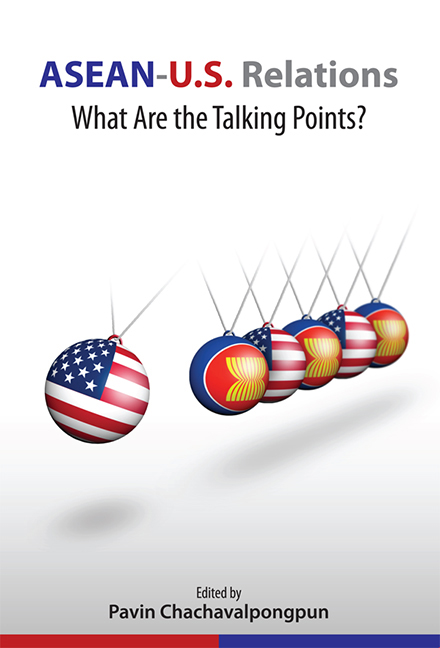Book contents
- Frontmatter
- Contents
- List of Tables and Figures
- Preface
- Contributors
- List of Abbreviations
- OVERVIEW
- 1 U.S. Engagement with ASEAN
- 2 ASEAN-U.S. Relations
- 3 Developments in ASEAN-U.S. Relations
- 4 The United States, Russia to be Part of East Asia Summit
- 5 How Does the United States Play into the East Asia Summit for ASEAN?
- QUINTESSENTIAL ISSUES
- Index
3 - Developments in ASEAN-U.S. Relations
from OVERVIEW
Published online by Cambridge University Press: 21 October 2015
- Frontmatter
- Contents
- List of Tables and Figures
- Preface
- Contributors
- List of Abbreviations
- OVERVIEW
- 1 U.S. Engagement with ASEAN
- 2 ASEAN-U.S. Relations
- 3 Developments in ASEAN-U.S. Relations
- 4 The United States, Russia to be Part of East Asia Summit
- 5 How Does the United States Play into the East Asia Summit for ASEAN?
- QUINTESSENTIAL ISSUES
- Index
Summary
At this stage in ASEAN–United States relations, we should thoroughly explore ways to expand those relations, which have been given a renewed impetus under the administration of President Barack Obama. We should also reflect on the current situations in global and regional affairs that impact on ASEAN-U.S. relations, and their implications for the future direction of this relationship. Among some of these concerns are the lingering impact of the recent global economic crisis and the threat of a possible double-dip recession emanating from the eurozone; the continuing, perhaps unending, war against terror; the fast pace of regional political as well as economic integration; and the increasing precariousness of the security situation in our region and among our neighbours.
OVERVIEW OF ASEAN-U.S. RELATIONS
Throughout the past three decades, ASEAN-U.S. relations have rapidly grown and expanded to cover a wide range of areas, including political security; economic, trade and investments; social and cultural; and development cooperation.
The principal focus of political-security cooperation has been the role of the United States in maintaining peace and stability in the region, including nuclear non-proliferation, counterterrorism, combating transnational crime, and the situation in Northeast Asia, including the Korean Peninsula. Recently, ASEAN leaders have talked about the evolving regional architecture and the United States’ possible future participation in such a regional arrangement. There are indications that the United States is interested in following the discussions on the evolving regional architecture and recognizes ASEAN's central role as a driving force in any form of regional architecture that is being discussed. The United States, nonetheless, actively participates in existing regional cooperation frameworks, such as the ASEAN Regional Forum (ARF). ASEAN welcomed the United States’ accession to the Treaty of Amity and Cooperation (TAC) in Southeast Asia during the Post Ministerial Conference (PMC) in July 2009. This is another signal of the United States’ renewed vigour in its engagement with ASEAN, particularly in the security field.
- Type
- Chapter
- Information
- ASEAN-U.S. RelationsWhat Are the Talking Points?, pp. 10 - 16Publisher: ISEAS–Yusof Ishak InstitutePrint publication year: 2011

